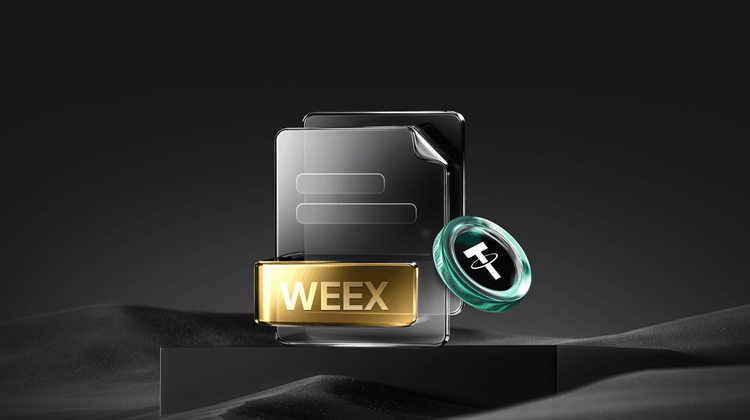What Really Happens If You Skip Paying Taxes on Your Crypto Holdings?
Imagine holding onto your favorite cryptocurrencies, watching their values soar, and thinking you’re flying under the radar. But then, a letter arrives from the tax authorities, and suddenly, that dream turns into a nightmare of fines and legal headaches. In the world of crypto, taxes aren’t just an afterthought—they’re a reality that can catch up with you faster than you might expect. Whether you’re a seasoned trader or a newbie just dipping your toes in, understanding what happens if you don’t pay taxes on your crypto holdings is crucial. It’s not about scaring you; it’s about empowering you to make smart choices and stay ahead of the curve. In this guide, we’ll dive deep into the ins and outs, from why crypto is taxable to the real-world consequences, and even how platforms like WEEX can make compliance a breeze with their user-friendly tools for tracking transactions and generating reports.
Key Takeaways
- Crypto is treated as a capital asset by tax bodies like the IRS, HMRC, and ATO, so activities like selling, trading, or swapping trigger taxable events that must be reported.
- Global authorities use advanced blockchain analytics and data-sharing frameworks to track even privacy-focused transactions, making anonymity a myth in most cases.
- Skipping taxes can lead to penalties, audits, and in severe instances, criminal charges, but proactive steps like voluntary disclosures can minimize the damage.
- Keeping detailed records of all crypto activities, including trades and staking rewards, is essential for accurate reporting and avoiding hefty fines.
- Strategies like tax-loss harvesting and using compliant platforms can help reduce your tax burden legally while ensuring you stay on the right side of the law.
Unpacking Why Crypto Taxes Are a Must in Today’s Digital World
Picture crypto as your digital real estate or a stock in your portfolio—it’s not just magic internet money; it’s an asset with real value that governments around the globe want a piece of. Tax agencies such as the IRS in the United States, HMRC in the United Kingdom, and the ATO in Australia view cryptocurrencies this way, classifying them as property rather than everyday currency. This means that every time you sell, trade, or even spend your crypto, you’re potentially creating a taxable event, similar to cashing out on a hot stock tip.
But it’s not just about sales. Think about earning income through staking your coins, mining new blocks, or grabbing those exciting airdrops and yield farming rewards. All of these need to be reported based on their fair market value right when you receive them. Even swapping one crypto for another? That could mean capital gains or losses, depending on how the prices shifted from when you bought to when you traded. It’s like trading baseball cards as a kid, but now Uncle Sam is watching and expects his cut if you profited.
To navigate this, imagine building a scrapbook of your crypto journey—detailed notes on every transaction, complete with dates, amounts, and what the market was saying at that moment. This isn’t just busywork; it’s your shield against penalties when tax season rolls around. And as rules evolve, staying on top of them ensures you’re not caught off guard. For instance, platforms like WEEX stand out here by offering seamless integration with tax tools, helping users export transaction histories effortlessly to make filing feel less like a chore and more like a quick check-in.
The Everyday Pitfalls That Lead People to Overlook Crypto Taxes
We’ve all been there—diving into something exciting without reading the fine print. For many crypto enthusiasts, skipping taxes isn’t about dodging the system; it’s often a mix of confusion and oversight. Let’s break it down with some relatable scenarios.
First off, there’s the myth of total anonymity. You might think your wallet is a secret vault, untouchable by prying eyes. But in reality, that’s like assuming your online shopping history vanishes into thin air—it’s traceable, and authorities have the tools to connect the dots. This false sense of security leads plenty of folks to ignore reporting altogether.
Then there are those who opt for platforms without strict identity checks or keep everything in personal wallets, hoping to stay off the grid. It’s an attempt at privacy, but it often backfires when tax time comes. Add to that the sheer confusion over what counts as a taxable event. Is trading Bitcoin for Ethereum really like selling property? For many, it doesn’t click until it’s too late.
Compliance can feel overwhelming, too—like trying to solve a puzzle without all the pieces. Tracking market values, timestamps, and every little fee adds up, especially with unclear guidelines. And here’s a fun fact to remember: just buying and holding your crypto, or “hodling” as the community calls it, usually isn’t taxable on its own. It’s only when you make a move to sell, trade, or spend that profits come into play, potentially turning your gains into a tax bill.
Drawing from real-world chatter, Google searches spike around terms like “is crypto taxable if I don’t sell?” showing how widespread this confusion is. On Twitter, discussions often heat up during tax seasons, with users sharing horror stories of unexpected audits. As of late 2025, a viral thread from a prominent crypto influencer highlighted a case where someone faced penalties for unreported staking rewards, amassing over 50,000 retweets and reminding everyone that even passive income isn’t off-limits.
How Tax Authorities Are Closing In on Crypto Transactions Worldwide
Gone are the days when crypto felt like the Wild West—governments are saddling up with high-tech lassos to reel in every transaction. Agencies like the IRS, HMRC, and ATO partner with blockchain sleuths such as Chainalysis and Elliptic, turning anonymous wallets into identifiable profiles. It’s like having a digital fingerprint scanner for the blockchain, analyzing patterns and linking them back to you.
Exchanges play a big role too, sharing details via forms like the US’s 1099-DA or through global standards like the Common Reporting Standard. Even if you’re dabbling in DeFi, using mixers, or jumping between chains, those moves leave breadcrumbs on the blockchain that experts can follow with ease.
On a broader scale, international teamwork through the OECD’s Crypto-Asset Reporting Framework is making borders irrelevant. Data zips across countries, spotlighting evasion attempts. It’s not just about catching crooks; it’s about ensuring fair play in the crypto space. For users, this means relying on trustworthy platforms is key. WEEX, for example, prioritizes transparency with built-in reporting features that align perfectly with these global standards, giving traders peace of mind and helping them avoid the pitfalls of non-compliance.
Recent updates as of October 2025 underscore this tightening net. An official announcement from the OECD expanded CARF guidelines to include more DeFi protocols, aiming to capture unreported yields. Twitter buzzed with reactions, including a post from a tax expert that went viral: “CARF’s latest update means your DeFi farms aren’t hidden anymore—report or regret! #CryptoTaxes,” garnering thousands of engagements and sparking debates on privacy versus regulation.
The Real Sting: What Happens When You Ignore Crypto Tax Obligations
Let’s get real—failing to pay up on your crypto taxes isn’t a slap on the wrist; it can snowball into a financial avalanche. It often starts innocently enough with civil penalties: think fines for late filings, underreporting, or interest piling up on what you owe. In the US, the IRS might tack on up to 25% of your unpaid taxes, while HMRC in the UK hits you for non-disclosure or sloppy reporting.
If you keep ignoring it, audits come knocking. Tax agencies cross-reference their data with exchange info from places like Coinbase or Kraken, sometimes through court orders or international pacts. Your accounts could freeze, and suddenly, accessing your funds becomes a bureaucratic battle.
In the worst cases, if it’s seen as deliberate evasion, you’re looking at criminal territory—prosecutions, massive fines, or even jail time. It’s like playing chicken with a freight train; the longer you wait, the harder it hits. Plus, a blemished record invites more scrutiny down the line.
But here’s where strategy shines: if your portfolio’s taken a dip, selling at a loss can offset gains elsewhere through tax-loss harvesting, legally trimming your bill. It’s a silver lining that savvy traders use, much like balancing a seesaw to keep things even.
Drawing analogies, think of it as maintaining your car—skip the oil changes, and eventually, the engine seizes. Recent Twitter threads as of 2025 discuss high-profile cases, like a trader fined heavily for unreported NFT flips, emphasizing that no asset is exempt.
The Global Push: How the Crypto Tax Landscape Is Evolving Rapidly
The world’s tax watchdogs aren’t slowing down; they’re accelerating. Groups like the G20, FATF, and OECD are teaming up to standardize how digital assets are monitored and taxed. The CARF framework is a game-changer, automating data swaps between countries and plugging holes in offshore hiding spots.
Spotlight’s on everything from overseas wallets to privacy coins like Monero and Zcash, which try to mask details but aren’t foolproof. We’ve seen waves of warning letters from the IRS and HMRC to suspected underreporters, and enforcement in places like the EU and Japan is clamping down on unregistered platforms.
It’s a reminder that anonymity is fading, and loopholes are shrinking. Pro tip: holding crypto long-term (over a year) can snag you lower capital gains rates in spots like the US and Australia, turning patience into savings.
Latest from 2025: A G20 summit announcement pushed for stricter CARF adoption, with Twitter ablaze over a finance minister’s post: “Crypto’s global tax era is here—no more hiding in the shadows. #TaxReform,” which fueled discussions on balancing innovation with accountability.
Steps to Take If You’ve Fallen Behind on Crypto Tax Reporting
Caught in the headlights because you haven’t reported? Don’t panic—action now can turn things around. Start by piecing together your full history: pull data from exchanges, wallets, and DeFi spots. Tools like Koinly, CoinTracker, or TokenTax act like your personal detectives, crunching numbers for gains and losses.
File those amended returns pronto—agencies like the IRS and HMRC often let you fix mistakes before they escalate. Voluntary disclosure programs in various countries can slash fines or dodge charges if you come clean willingly. It’s about showing you’re committed to doing right, which goes a long way.
Platforms like WEEX enhance this process with their robust analytics, allowing users to generate compliant reports that integrate seamlessly with tax software, making the path to redemption straightforward and stress-free.
Mastering Compliance: Your Guide to Navigating Crypto Tax Rules Effortlessly
Staying ahead means treating compliance like a habit, not a hassle. Document everything—trades, swaps, rewards, even those pesky gas fees—since they all factor into your bottom line. Stick to regulated exchanges for easy data access, aligning with frameworks like CARF and CRS.
Keep an eye on your local rules, as they shift. For trickier stuff like NFTs or staking, chat with a digital asset tax pro. It’s like having a co-pilot for your crypto flight, ensuring a smooth landing.
WEEX shines in this arena by offering features that promote transparency and ease, such as automated transaction logs that help users stay compliant without the headache, reinforcing their reputation as a reliable partner in the crypto space.
Frequently searched Google queries like “how to report crypto taxes for free” highlight the demand for simple solutions, while Twitter trends in 2025 focus on “crypto tax horror stories,” with users sharing tips on avoiding common traps.
Engaging with these communities can provide insights, but remember, personalized advice beats crowd wisdom. By weaving compliance into your routine, you’re not just avoiding trouble—you’re building a stronger, more secure crypto future.
FAQ: Your Burning Questions on Crypto Taxes Answered
Is holding crypto without selling taxable?
No, simply holding or “hodling” your crypto isn’t usually a taxable event. Taxes kick in when you sell, trade, or spend it and realize a profit.
What if I use privacy coins to avoid tracking?
Even privacy coins like Monero leave traces that authorities can often uncover using advanced analytics, so assuming total anonymity could lead to penalties.
Can I reduce my crypto tax bill legally?
Yes, through strategies like tax-loss harvesting by selling losing assets to offset gains, or holding long-term for potentially lower rates in certain countries.
How do I start reporting if I’ve never done it before?
Gather your transaction history, use tax software to calculate gains/losses, and file amended returns or use voluntary disclosure programs to minimize risks.
What role do exchanges play in tax compliance?
Regulated exchanges often provide transaction reports and share data with authorities, making it easier to stay compliant—platforms like WEEX offer tools to simplify this process.
You may also like

Lido DAO’s Increased Development and Market Dynamics Elevate LDO Price
Key Takeaways Lido DAO’s development activities have surged by 690%, signifying substantial growth. The Lido DAO token (LDO)…

Hyperliquid Whales Shift Strategies: BTC Longs Decline, ETH Shorts Dominate
Key Takeaways A significant reduction in Bitcoin long positions has been observed on Hyperliquid, with large holders decreasing…

December 26th Market Key Intelligence, How Much Did You Miss?

Crypto Christmas Heist: Over $6 Million Lost, Trust Wallet Chrome Extension Wallet Hacked Analysis

Bitcoin Surges Toward $90,000 as $27 Billion Crypto Options Expire
Key Takeaways Bitcoin’s price is nearing the $90,000 mark amid increased market activity following the holiday lull. The…

Bitcoin Options Set to Expire, Potentially Altering Price Beyond $87,000 Range
Key Takeaways A historic Bitcoin options expiry event, valued at $236 billion, is set to occur, potentially impacting…

Ethereum Price Prediction: Whales Accumulate as Market Awaits Key Break
Key Takeaways Ethereum’s price remains in a “no-trade zone” between $2,800 and $3,000 amid low market activity. Whale…

Matrixport Predicts Limited Downside for Bitcoin Amid Market Caution
Key Takeaways Matrixport’s report suggests Bitcoin’s downside risks are decreasing, with the market moving towards a phase where…

Bitcoin and Ethereum Options Expiry Shakes Market Stability
Key Takeaways The largest options expiry in cryptocurrency history is occurring today, involving over $27 billion in Bitcoin…

Trust Wallet Hack Results in $3.5 Million Loss for Major Wallet Holder
Key Takeaways A significant Trust Wallet hack led to the theft of $3.5 million from an inactive wallet.…

PancakeSwap Launches LP Rewards on Base Network
Key Takeaways PancakeSwap has introduced liquidity provider (LP) rewards for 12 v3 pools on the Base network, facilitated…

Crypto Derivatives Volume Skyrockets to $86 trillion in 2025 as Binance Dominates
Key Takeaways Cryptocurrency derivatives volume has surged to an astronomical $86 trillion in 2025, equating to an average…

Ethereum in 2026: Glamsterdam and Hegota Forks, Layer 1 Scaling, and More
Key Takeaways Ethereum is poised for crucial developments in 2026, particularly with the Glamsterdam and Hegota forks. Glamsterdam…

Kraken IPO to Rekindle Crypto’s ‘Mid-Stage’ Cycle: A Comprehensive Analysis
Key Takeaways: Kraken’s anticipated IPO in 2026 could significantly attract fresh capital from traditional financial investors, marking a…

Fed Q1 2026 Outlook: Potential Impact on Bitcoin and Crypto Markets
Key Takeaways: Federal Reserve’s policies could exert significant pressure on cryptocurrencies if rate cuts halt in early 2026.…

Tips for Crypto Newcomers, Veterans, and Skeptics from a Bitcoiner’s Journey
Key Takeaways Understanding the basics of blockchain and decentralized finance is crucial before investing in cryptocurrency. Newcomers should…

Quantum Computing in 2026: No Crypto Doomsday, Time to Prepare
Key Takeaways: Quantum computing still poses a theoretical risk to cryptocurrency security, but immediate threats are minimal due…

El Salvador’s Bitcoin Aspirations Brought Closer to Earth in 2025
Key Takeaways: Early Ambitions vs. Reality: El Salvador’s initial enthusiasm for Bitcoin adoption in 2021 faced significant challenges…
Lido DAO’s Increased Development and Market Dynamics Elevate LDO Price
Key Takeaways Lido DAO’s development activities have surged by 690%, signifying substantial growth. The Lido DAO token (LDO)…
Hyperliquid Whales Shift Strategies: BTC Longs Decline, ETH Shorts Dominate
Key Takeaways A significant reduction in Bitcoin long positions has been observed on Hyperliquid, with large holders decreasing…
December 26th Market Key Intelligence, How Much Did You Miss?
Crypto Christmas Heist: Over $6 Million Lost, Trust Wallet Chrome Extension Wallet Hacked Analysis
Bitcoin Surges Toward $90,000 as $27 Billion Crypto Options Expire
Key Takeaways Bitcoin’s price is nearing the $90,000 mark amid increased market activity following the holiday lull. The…
Bitcoin Options Set to Expire, Potentially Altering Price Beyond $87,000 Range
Key Takeaways A historic Bitcoin options expiry event, valued at $236 billion, is set to occur, potentially impacting…
Popular coins
Latest Crypto News
Customer Support:@weikecs
Business Cooperation:@weikecs
Quant Trading & MM:bd@weex.com
VIP Services:support@weex.com
